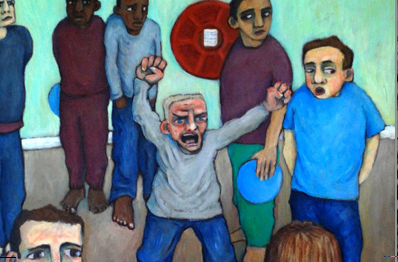The Supreme Court this morning rejected a challenge to a refusal by police to disclose evidence made to assist the overturning of a conviction, in a test case for miscarriages of justice. Giving judgment, Lord Thomas called upon the Criminal Cases Review Commission – which he called ‘the safety net’ in such disputes – not to limit its inquiries to when a reasonable prospect of such a conviction being quashed was ‘already demonstrated’.
The appeal concerned the case of Kevin Nunn, convicted in 2006 of murdering his former partner Dawn Walker. In March 2012, the Divisional Court upheld a refusal by Suffolk Police to allow access to case material so it could be tested (at the family’s expense) using techniques not available at the trial. Critically, the court ruled the state’s duty to provide disclosure ended on conviction. Other forces have been refusing to co-operate with other appeals in anticipation of today’s ruling.
You can read James Saunders, the solicitor who acted for Kevin Nunn in The Catch 22s facing the wrongly accused.
A need for finality
Today’s ruling concerned the post-conviction duty of disclosure. ‘The basis of the common law duty of disclosure is fairness,’ explained Lord Thomas giving judgment. However, fairness did not require ‘the same level of disclosure at every stage of the process’ and there was ‘no basis for finding a temporally limitless duty of disclosure post-conviction’.
‘During trial, the defendant is presumed innocent: post-conviction he/she is proved guilty,’ Lord Thomas continued. ‘There is an important public interest in exposing any flaw in the conviction, but there is also a powerful public interest in finality of proceedings, and in ensuring that the police’s finite resources are applied to current investigations, unless there is a good reason for review.’
Lord Thomas said that ‘clearly’ if the police or prosecution came into possession of ‘evidence affording arguable grounds for contending that the conviction was unsafe’ it was their duty to disclose.’ This was the limit of the duty of disclosure, he noted, adding that there were ‘additional safety nets’. Notably, there was the Criminal Cases Review Commission and its ‘power to direct new scientific tests’.
‘The safety net in the case of disputed requests for review lies in the CCRC. That body does not, and should not, make enquiries only when reasonable prospect of a conviction being quashed is already demonstrated. It can and does in appropriate cases make enquiry to see whether such prospect can be shown.’
Lord Thomas
The court made clear that if there was a real prospect that further enquiry would uncover something that might affect the safety of the conviction ‘then there should be co-operation in making it’. ‘It is in nobody’s interest to resist all enquiry unless and until the CCRC directs it,’ Lord Thomas added.
Catch 22
‘This places an important new duty on the Commission not to refuse arbitrarily to investigate cases as happened to Victor Nealon who spent 17 years in prison for a crime he did not commit until his December 2013 release by the Court of Appeal,’ commented Inside Justice director Louise Shorter. As reported on www.thejusticegap.com Victor Nealon was yesterday refused compensation by the Ministry of Justice despite the CCRC’s chairman Richard Foster having apologised for his organisation’s shortcomings in relation to the case.
The defence lawyer James Saunders said that the judgement reversed a position that the CCRC had taken ‘many times when refusing to carry out new scientific tests on the ground that they are speculative’. ‘The CCRC has historically taken the view that until test results have been obtained, it does not have any fresh evidence that could support a reference to the Court of Appeal, as is its purpose under the Criminal Appeal Act 1995. Without the evidence CCRC has felt unable to take up the case. Catch 22.’
The solicitor also cited the case of Victor Nealon ‘whose CCRC applications failed because of this very issue and protracted his detention by 10 years’. ‘It is to be hoped that the CCRC and police embrace the Supreme Court reasoning,’ Saunders said. ‘It is inevitable that the number of miscarriages of justice at trial will increase as legal aid for defendants has been cut back and often will not cover a proper examination of the available scientific evidence at trial.’
‘The different and proactive position taken in the US has resulted in hundreds of miscarriages of justice being detected, including death row cases. In about half of those cases, DNA profiling identified the true killer or rapist, and apart from doing justice to the innocent, society has an overwhelming interest in protecting itself from the actual killers and rapists.’
James Saunders
According to Louise Shorter, a number of police forces have been refusing to co-operate with their investigations into alleged miscarriages since March (when the case was heard by the Supreme Court) in an anticipation of the ruling. ‘We call upon all police forces to study the Supreme Court’s judgment and to co-operate as advised with enquiries made by lawyers, investigative journalists and others,’ said Shorter.
‘The decision to refuse the claimant’s request for material in this case was not taken lightly,’ commented a spokesman for Suffolk Constabulary. ‘Today’s Supreme Court judgement supports the view that the correct decisions have been taken in this case.’
‘The Supreme Court judgement talks about there being finality and that police resources must be directed mostly at new police investigations, not investigating old cases. Whether it is lawyers acting for a prisoner, organisations like Inside Justice or investigative journalists, we are not asking for the police to reinvestigate the case. All we’re doing is asking them to release evidence. In the case of Kevin Nunn, it will have taken far more in terms of police resources to block requests than it would ever have done to have exhibits released and sent off to an independent accredited laboratory. The issue of resources is a red herring.’
Louise Shorter







